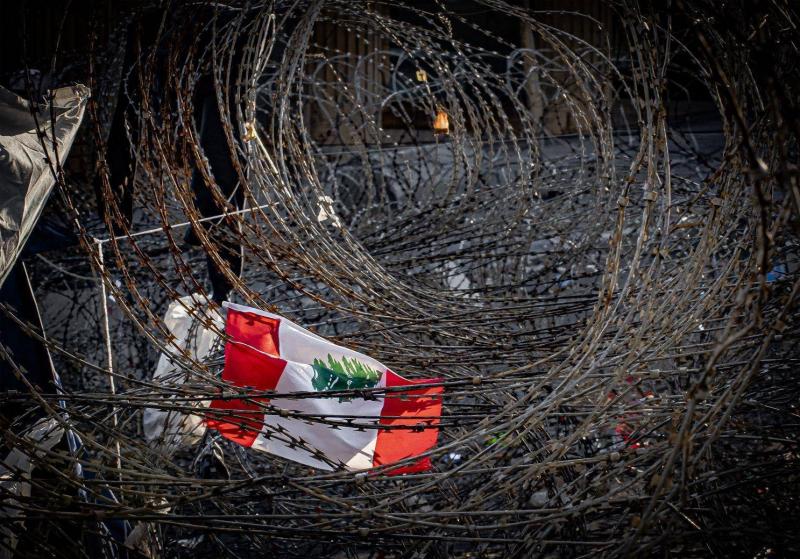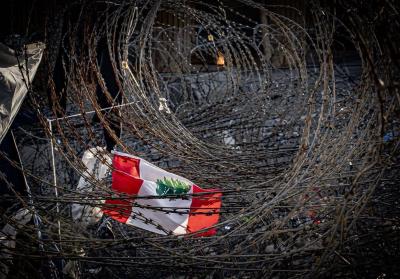Recently, Lebanon has witnessed a series of significant events and notable occurrences on various levels. From the kidnapping and killing of the Lebanese Forces official Pascal Sleiman in Jbeil, accompanied by the ensuing ramifications, stances, reactions, and media, political, and sectarian excitement... to the ongoing war tactics in the south, with its violence, outcomes, losses, and shocking realities... to Iran's response to Israel and the expectations and implications that followed, to the assassination of the Lebanese money changer in a villa in the heart of the Metn area, allegedly by the Israeli Mossad, according to the Lebanese interior minister, to other similar incidents in the region... etc.
In this turmoil, public opinion did not pay attention or pause to reflect on the intriguing and distinctive political debate that occurred between two important figures in the Lebanese public and political life. They are the distinguished Ja'fari Mufti Sheikh Ahmad Qablan, who took on this position after his late father, the historical and famous Ja'fari Mufti Sheikh Abdul Amir Qablan, known for his strong, frank, pivotal, and impactful positions in the past, and the former Lebanese Forces deputy and official Eli Kairouz, who is notably one of the prominent Bashrouwi figures (from the town of Bsharri) and is among the closest in thought and region to Dr. Samir Geagea, being deeply involved in the political and historical theories related to the Lebanese entity and the current system of governance between the past and present. He is the ideological preparation official in the Lebanese Forces.
The Ja'fari Mufti delivered the Eid al-Fitr sermon from the pulpit of the historical Imam Hussein Mosque in Burj al-Barajneh in the heart of the crowded popular southern suburb. Indeed, the text of the sermon delivered by the Ja'fari Mufti is considered one of the most important explicit and straightforward political texts, revealing the language and backgrounds of the political sectarian environment represented by Sheikh Qablan currently, encapsulating a large part of its thinking, logic, and aspirations.
Sheikh Qablan, while discussing Lebanon and the region and those he represents, stated: "The matter is concluded after the test with a majority that has harshly treated and a very small minority that has endured and sacrificed for their country and people. This small group was sufficient to deal the worst defeat to the enemy of God and the enemy of mankind and homelands." He added: "It is noteworthy that this group did not monopolize; rather, they utilized all their sacrifices and capabilities for their country and people without seeking gratitude." He stated: "This is our story in this country and its south, where its people have endured Zionist massacres and waves of Israeli terrorism since 1948, and no one defended them but others, even the Lebanese state."
The Ja'fari Mufti continued his sermon to commend the sacrifices of the Amal Movement and Hezbollah for the sake of saving Lebanon, specifically addressing the invasion of 1982 and resistance against the Israeli occupation, reaching the liberation of the south in 2000, despite, in his view, the Arabs and others abandoning Lebanon, away from the "den of the Security Council and the lie of international justice," as he expressed, etc.
The Ja'fari Mufti expressed even more explicit words, as he referenced the past and the usual historical narrative, criticizing: "Let us leave the story of Lebanon's glory and the historical foundation narrative, because the foundation of Lebanon and the entities of the region was based on the maps of colonial French and British interests. Nevertheless, we are not among those who deny the efforts of Patriarch Hwayek on the one hand, except that the foundation of Lebanon and the state served a group that took without giving, participated in the spoils without sharing the burdens, and even today, Lebanon and its people suffer from political injustice, factionalism, and sectarian legacies that have turned the state and country into a 'sardine can' and undermined the legal value of the homeland and its citizens."
In his speech, Sheikh Qablan declared his rejection of the proposals for cantons, division, and sectarian incitement, summarizing his remarks by saying: "We will not accept any presidential settlement that contradicts the national epic led by the resistance on the southern front. What is required from the internal partners is to meet the national duo with a presidential settlement that befits the sacrifices of the greatest sovereign resistance ever."
This statement was responded to the following day by "Lebanese Forces" figure Eli Kairouz from Bashrouh, who argued that the Shiite sect was marginalized during the Ottoman and Mamluk sultanates, and that those who did justice to them and paved the way for them to take their role in Lebanon were the formula of Greater Lebanon post-independence, relying on statements by Sheikh Mohammad Mahdi Shamsuddin and the Southern communist leader Karim Mroue on this topic.
In practice, Sheikh Qablan's remarks constitute criticism and an attack on the governing formula of Greater Lebanon that arose from Maronite predominance, while Kairouz's comments focus on the deprivation and marginalization that Shiites experienced during the periods of Ottoman governance and before. In other words, Kairouz responded to the Mufti that it was not the Maronites who marginalized you, but the previous sultanates of the Ottomans and Mamluks. We, the people of Greater Lebanon, have done justice to you and granted you your role... etc.
However, what was absent from the minds of the Ja'fari Mufti and the Bashrouwi activist is that Lebanon belongs to all its components. Its identity was built on a successful experience of national unity over decades, in addition to the advanced formula of its constitutional system relative to the systems in the region, which have been devoid of constitutions and laws. It may be the only country that relies on a successful experience of multi-religious coexistence, shared between Muslims and Christians, in the region and the world. This has provided most of its components with periods of prosperity and comfort, making it a shining jewel on the Mediterranean coast, containing a distinctive formula that has set an example for many countries and societies, which have swiftly been destroyed by the region's conflicts and the controlling powers and resentments, not benefiting from the outcomes of those conflicts.
Both parties did not consider that it is possible to restore this radiance and prosperity, at least partially, if the Lebanese people appreciate the importance of the experience they once had and the significance of what can develop in the upcoming days, provided it is protected and implemented in the future.
The disparity is evident between the two lines and rationales. The first denounces the formula of Greater Lebanon, which was born from colonialism and promotes the flourishing and entrenched resistance formula today. The second is still confused by the anxieties of the past between the concepts of subjugation and oppressed minorities. However, what united them, in addition to the debate and discord, was their neglect to acknowledge the significance of Lebanon's democratic parliamentary and constitutional system and the necessity of adhering to the traditions of the rule of law and institutions to protect all its citizens, not just its sects, and the way of life agreed upon by the Lebanese people in all their components. This is a matter not found elsewhere in the nearby surroundings, which is descending into deterioration and disintegration.




